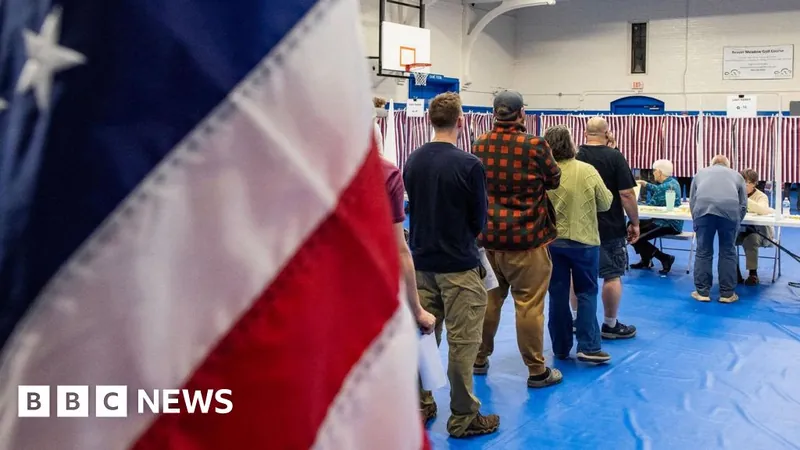
Dollar and Bitcoin Surge as Trump Secures Presidential Win
2024-11-06
Author: Jia
In a political shocker, the US dollar has surged, propelled by projections that Donald Trump has won the presidency, marking his return to the White House for a second term.
Accompanying the dollar's rise, Bitcoin has reached unprecedented heights with a jump of $6,000, hitting a record high of $75,371.69, surpassing its previous peak from March. Traders are reacting to anticipated tax cuts, heightened tariffs, and potential inflationary pressures under Trump's leadership.
This electoral outcome is expected to reverberate throughout the global economy. With the Republican Party poised to also gain control over the Senate, the ramifications could be both immediate and far-reaching.
The dollar has soared by approximately 1.5% against major global currencies, including the British pound, euro, and Japanese yen. In Japan, the Nikkei 225 index surged by 2.6%, while Australia's ASX 200 ended the day up by 0.8%. The major U.S. stock indices are set for a robust opening, benefiting from sharply higher closes on Tuesday, where the Dow Jones Industrial Average, S&P 500, and Nasdaq all gained over 1%.
Why is Bitcoin skyrocketing? Trump has vocalized a commitment to make the US the "bitcoin and cryptocurrency capital of the world." His administration may align closely with cryptocurrency advocates, including Tesla CEO Elon Musk, who previously voiced support for digital currencies and invested heavily in Bitcoin.
Tesla’s shares listed in Frankfurt surged over 14% at the market's opening, backed by Musk's ongoing support for Trump. However, experts caution that financial markets may experience volatility as investors respond to global uncertainties tied to Trump's economic agenda.
Finance strategist Lindsay James from Quilter Investors warns, "Many of his measures will be inflationary and likely to lead to a rise in bond yields, putting pressure on the Federal Reserve to maintain low-interest rates."
Trump's proposed trade policies, particularly the threat to increase tariffs on China, are already causing jitters in Asian markets. Katrina Ell from Moody's Analytics highlights the potential distress these protectionist measures might bring, noting the anxiety surrounding US-China relations could impact critical supply chains, especially with Taiwan's vital role in semiconductor production.
Markets in mainland China reflected this uncertainty, with the Shanghai Composite Index slightly down by 0.1% and Hong Kong's Hang Seng Index falling approximately 2.23%. Meanwhile, Trump's tax-cutting initiatives are being favorably received by major U.S. corporations, potentially stoking inflationary pressures. Jun Bei Liu, a portfolio manager at Tribeca Investment Partners, suggests that these changes may drive inflation upward, complicating the Federal Reserve’s interest rate decisions.
Investors are keeping their eyes peeled for critical developments this week, including an interest rate decision from the Federal Reserve, where Chair Jerome Powell’s statements will be closely monitored for insights into future economic policies. Additionally, on Friday, key Chinese officials are expected to reveal more on Beijing's strategies to combat economic slowdowns amid looming uncertainties.



 Brasil (PT)
Brasil (PT)
 Canada (EN)
Canada (EN)
 Chile (ES)
Chile (ES)
 España (ES)
España (ES)
 France (FR)
France (FR)
 Hong Kong (EN)
Hong Kong (EN)
 Italia (IT)
Italia (IT)
 日本 (JA)
日本 (JA)
 Magyarország (HU)
Magyarország (HU)
 Norge (NO)
Norge (NO)
 Polska (PL)
Polska (PL)
 Schweiz (DE)
Schweiz (DE)
 Singapore (EN)
Singapore (EN)
 Sverige (SV)
Sverige (SV)
 Suomi (FI)
Suomi (FI)
 Türkiye (TR)
Türkiye (TR)